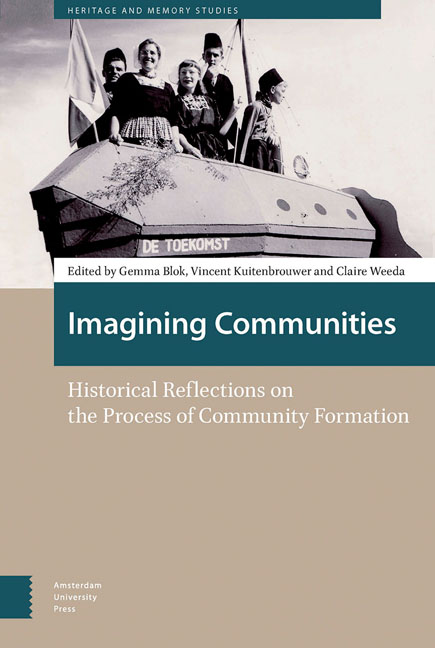Book contents
- Frontmatter
- Contents
- List of Figures
- Introduction
- 1 Meanwhile in Messianic Time: Imagining the Medieval Nation in Time and Space and English Drinking Rituals
- 2 Diverse Origins and Shared Circumstances: European Settler Identity Formation in the Seventeenth-Century Plantation Colony of Suriname
- 3 Imagining Europe: The Peace of Ryswick (1697) and the Rise of European Consciousness
- 4 Gypsy Music and the Fashioning of the National Community
- 5 ‘Tired, Worried and Overworked’: An International Imagined Community of Nervous Sufferers in Medical Advertisements, 1900-1920
- 6 ‘From Heart to Heart’: Colonial Radio and the Dutch Imagined Community in the 1920s
- 7 Indonesian Nationalism in the Netherlands, 1920s-1930s: Long-Distance Internationalism of Elite Pilgrims in Homogeneous, Empty Time
- 8 Time, Rhythm and Ritual: Imagined Communities in L’espoir (1937) and Les sept couleurs (1939)
- 9 Stamverwantschap and the Imagination of a White, Transnational Community: The 1952 Celebrations of the Jan van Riebeeck Tercentenary in the Netherlands and South Africa
- 10 ‘L’Oranie Cycliste, une grande famille’: Recycling Identities and the Pieds-Noirs Communitas, 1976-2016
- 11 Remembering and Imagining the National Past: Public Service Television Drama and the Construction of a Flemish Nation, 1953-1989
- Index
11 - Remembering and Imagining the National Past: Public Service Television Drama and the Construction of a Flemish Nation, 1953-1989
Published online by Cambridge University Press: 11 December 2020
- Frontmatter
- Contents
- List of Figures
- Introduction
- 1 Meanwhile in Messianic Time: Imagining the Medieval Nation in Time and Space and English Drinking Rituals
- 2 Diverse Origins and Shared Circumstances: European Settler Identity Formation in the Seventeenth-Century Plantation Colony of Suriname
- 3 Imagining Europe: The Peace of Ryswick (1697) and the Rise of European Consciousness
- 4 Gypsy Music and the Fashioning of the National Community
- 5 ‘Tired, Worried and Overworked’: An International Imagined Community of Nervous Sufferers in Medical Advertisements, 1900-1920
- 6 ‘From Heart to Heart’: Colonial Radio and the Dutch Imagined Community in the 1920s
- 7 Indonesian Nationalism in the Netherlands, 1920s-1930s: Long-Distance Internationalism of Elite Pilgrims in Homogeneous, Empty Time
- 8 Time, Rhythm and Ritual: Imagined Communities in L’espoir (1937) and Les sept couleurs (1939)
- 9 Stamverwantschap and the Imagination of a White, Transnational Community: The 1952 Celebrations of the Jan van Riebeeck Tercentenary in the Netherlands and South Africa
- 10 ‘L’Oranie Cycliste, une grande famille’: Recycling Identities and the Pieds-Noirs Communitas, 1976-2016
- 11 Remembering and Imagining the National Past: Public Service Television Drama and the Construction of a Flemish Nation, 1953-1989
- Index
Summary
Abstract
This chapter argues that the conception of the nation as an imagined community is particularly productive to analyse twentieth-century broadcasting. Public service broadcasting (PSB) explicitly aimed to provide viewers with images of their nation and its culture, as a nationalized, public institution stimulating national coherence on a symbolical level. This chapter takes the example of Flanders, a region with growing national ambitions from the 1950s. From 1953, public service broadcaster NIR (later BRT, BRTN and now VRT) provided representations of this assumedly old and homogeneous ‘nation’, drama series presenting vivid and popular narratives about ‘our’ region, people and history. Nostalgia marked these productions, a bitter-sweet commemoration of the poor yet simple and sociable life in Flemish villages of the first half of the twentieth century.
Keywords: public service broadcasting, national identity, period drama, representation, nostalgia
Television plays a major role in shaping ideas about ‘the nation’. As a mass medium, it can and does address a large and varied segment of the national population, entering their lives on an everyday basis in the privacy of their homes. For this reason, in the mid-twentieth century the development of the new medium was closely guarded and regulated by governments. Across Europe, the model of public service broadcasting (PSB) was adopted, explicitly linking broadcasting institutions to national aspirations and policies. Television was conceived as a national medium in its organization, its programmes and its audience.
This chapter explores connections between television as an institution and the nation as an imagined community, focusing in particular on the case of Flanders, the northern, Dutch-speaking part of Belgium. The central question it addresses is: how did public television in Flanders contribute to the construction of a ‘national’ Flemish imagined community? While it is not a nation-state, Flanders has national aspirations which from the 1950s were supported – albeit implicitly – by the fast-growing medium of television. Providing images of the nation, television literally contributed to the ‘imagining’ of the nation, creating a set of widely shared representations of and discourses about Flanders. One key dimension in these representations was the establishment of connections with the ‘national’ past, creating a sense of shared history.
- Type
- Chapter
- Information
- Imagining CommunitiesHistorical Reflections on the Process of Community Formation, pp. 215 - 230Publisher: Amsterdam University PressPrint publication year: 2018



